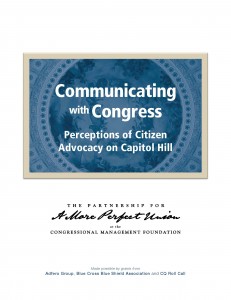 This report is based on an online survey of congressional staff on their opinions and practices related to constituent communications, including grassroots advocacy campaigns and social media.The survey was conducted between October 12 and December 13, 2010 and had 260 respondents.
This report is based on an online survey of congressional staff on their opinions and practices related to constituent communications, including grassroots advocacy campaigns and social media.The survey was conducted between October 12 and December 13, 2010 and had 260 respondents.
This report was sponsored by Adfero Group, Blue Cross Blue Shield Association, and CQ Roll Call. We thank them for their support of CMF's Partnership for a More Perfect Union.
![]() CWC - Perceptions of Citizen Advocacy (1 MB)
CWC - Perceptions of Citizen Advocacy (1 MB)
Key Findings
- The Internet, Participation and Accountability. Most staffers (87%) thought email and the Internet have made it easier for constituents to become involved in public policy. A majority of staff (57%) felt email and the Internet have made Senators and Representatives more accountable to their constituents. Less than half (41%) thought email and the Internet have increased citizens' understanding of what goes on in Washington.
- Citizens Have More Power Than They Realize. Most of the staff surveyed said constituent visits to the Washington office (97%) and to the district/state office (94%) have 'some' or 'a lot' of influence on an undecided Member, more than any other influence group or strategy. When asked about strategies directed to their offices back home, staffers said questions at town hall meetings (87%) and letters to the editor (80%) have 'some' or 'a lot' of influence.
- It's Not the Delivery Method – It's the Content. There is virtually no distinction by the congressional staff we surveyed between email and postal mail. They view them as equally influential to an undecided Member. Nearly identical percentages of staffers said postal mail (90%) and email (88%) would influence an undecided Member of Congress.
- Grassroots Advocacy Campaigns – Staff are Conflicted. The congressional staff we surveyed have conflicting views and attitudes about the value of grassroots advocacy campaigns. More than one-third of congressional staff (35%) agreed that advocacy campaigns are good for democracy (25% disagreed). Most staff (90%) agreed – and more than 60% strongly agreed – that responding to constituent communications is a high priority in their offices. But, more than half of the staffers surveyed (53%) agreed that most advocacy campaigns of identical form messages are sent without constituents' knowledge or approval.
- Social Media Used to Listen and Communicate. Congressional offices are integrating social media tools into their operations, both to gain an understanding of constituents' opinions and to communicate information about the Member's views. Nearly two-thirds of staff surveyed (64%) think Facebook is an important way to understand constituents' views and nearly three-quarters (74%) think it is important for communicating their Member's views.


